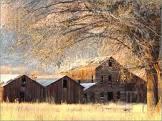
Greed and its futility seem to be the theme of today’s liturgy. Ecclesiastes is one of the wisdom books of the bible, and the extract for today points out that all worldly gain, though it may be achieved by honest labour, must be left behind at death. The man in Jesus’ parable would appear to have been prudent. He had a good crop and he needed to store it. Aren’t we constantly told not to waste food? However the landowner was hoarding grain all for himself and was looking forward to a life of self-indulgence. He had no thought for those around him who had little or nothing. He was creating an earthly paradise. The trouble was that he was not going to live to enjoy it.
As the teacher in the first reading says, the barns full of his crops were not going with him! The imagery of the extension of storage area powerfully symbolises the way in which those who are wealthy often want more. They try to emulate people who have better houses, better cars and better lifestyles. Often a person defines themself by what they have rather than what they are. The rich man was probably not evil, only very selfish. He was like Narcissus, gazing at his own reflection in the water.
Jesus talked about storing up treasures in Heaven, which will not be consumed by moth or rust (Matthew 6:19-21). Such spiritual riches accrue by a growth in love of God and of neighbour. Overflowing barns do not have much space for this.